French fleet: between the hammer and the anvil
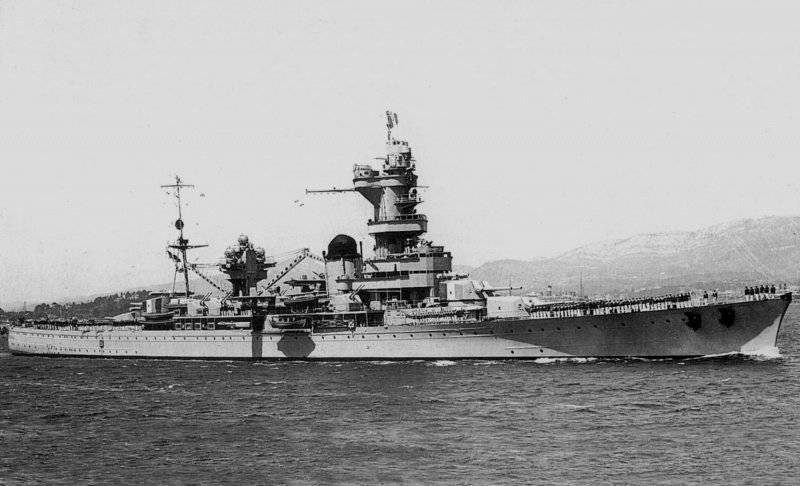
After France retired, the English fleet was able to cope with the combined naval forces of Germany and Italy. But the British, not without reason, feared that modern and powerful French ships could fall into the hands of the enemy and be used against them. Indeed, apart from the Compound X neutralized in Alexandria and scattered around the world by several cruisers, destroyers, the Bearn aircraft carrier and small ships, only two very old battleships Paris and Kurbe took refuge in English ports. 2 super destroyers (leaders), 8 destroyers, 7 submarines and other trifles - no more than a tenth of the French fleetjudged by the displacement, and complete insignificance, judged by their real power. As early as June 17, Fleet Commander Admiral Dudley Pound reported to Prime Minister W. Churchill that in Gibraltar, under the command of Vice Admiral James Somerville, the N compound, led by the Hood battlecruiser and the Ark Royal carrier, was to be deployed. for the movements of the French fleet.
When the truce became a fait accompli, Somerville was ordered to neutralize the French ship that was the most potential threat in the ports of North Africa. The operation was called "Catapult."
Since it was not possible to make this possible through diplomatic negotiations, the British, who were not used to being shy in their choice of means, had no choice but to use brute force. But the French ships were quite powerful, stood in their own bases and under the protection of coastal batteries. Such an operation required an overwhelming superiority in forces in order to persuade the French to fulfill the requirements of the British government or, in the event of refusal, to destroy. Somerville's compound looked impressive: the battle cruiser “Hood”, the battleships “Resolution” and “Valiant”, the aircraft carrier “Arc Royal”, the light cruisers “Areutyuz” and “Enterprise”, 11 destroyers. But he was confronted a lot - in Mers-El-Kebir, chosen as the main target of the attack, there were the battleships Dunkirk, Strasbourg, Provence, Brittany, the leaders of Volta, Mogador, Tigr, Lynx "," Kersaint "and" Terribl ", hydroavian carrier" Commandant Test ". Nearby, in Oran (just a few miles to the east), there was a gathering of destroyers, patrol men, minesweepers and relocated unfinished ships from Toulon, and in Algeria there were eight 7800-ton cruisers. Since the large French ships in Mers-el-Kebir were moored to the pier aft towards the sea, and with their head to the shore, Somerville decided to use the factor of surprise.
Connection "H" came to Mers-el-Kebir in the morning of July 3 1940 of the year. Exactly at 7 hours GMT, a lonely destroyer Foxhound with a captain Holland aboard entered the harbor, who informed the French flagship on Dunkirk that he had an important report for him. Holland was formerly a naval attache in Paris, and many French officers knew him closely, and in other conditions Admiral Gensoul would have received him with all his heart. What a surprise the French admiral would be when he learned that the “report” is nothing more than an ultimatum. And observers have already reported the appearance on the horizon of the silhouettes of the English battleships, cruisers and destroyers. It was Somerville’s prudent move, reinforcing his parliamentary with a show of force. It was necessary to immediately show the French that they are not joking. Otherwise, they could prepare for battle, and then the situation would change radically. But this allowed Zensulu to play offended dignity. He refused to talk to Holland, sending his flag officer Lt. Bernard Dufay to the negotiations. Dufay was a close friend of Holland and spoke excellent English. Thanks to this, negotiations did not stop without starting.
In Sommervil's ultimatum. Written on behalf of "His Majesty's Government", after reminders of joint military service, German cunning and the previous agreement from 18 June between the governments of Britain and France that before capitulation on land, the French fleet would join the British or flooded the French naval commander in Mers-el-Kebir and Oran were offered a choice of four options for action:
1) go to sea and join the British fleet to continue the struggle until victory over Germany and Italy;
2) go to sea with reduced crews to sail to British ports, after which the French sailors will be repatriated immediately, and the ships will be saved for France until the end of the war (full monetary compensation was offered for loss and damage);
3) in case of unwillingness to allow the use of French ships against the Germans and Italians at all, so as not to violate an armistice with them, go under British escort with reduced crews to French ports in the West Indies (for example, Martinique) or to the ports of the United States where ships will be disarmed and saved until the end of the war, and the crews will be repatriated;
4) in case of refusal of the first three options - to flood the ships within b hours.
The ultimatum ended with a phrase that should be given in its entirety: “In case of your refusal from the above, I have the order of His Majesty's Government to use all the necessary forces to prevent your ships from falling into the hands of Germans or Italians.” This, quite simply, meant that the former allies would open fire to kill.
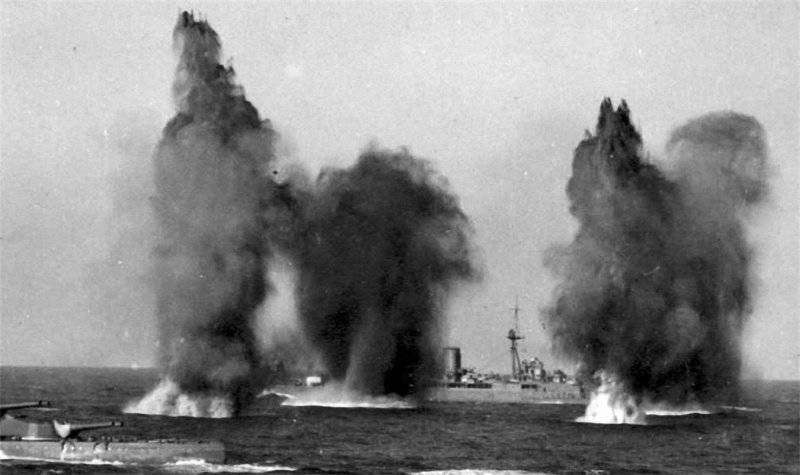
The first two options Zensul rejected immediately - they directly violated the terms of the truce with the Germans. The third was also hardly considered, especially under the impression of the German ultimatum received that morning: “Either all ships are returned from England or a complete revision of the terms of the armistice”. At 9, Dufay gave Holland the answer of his admiral, in which he stated that since he could not surrender his ships without an order from the French Admiralty, he could only flood it under the order of Admiral Darlan, which had retained its strength, in case of danger of capture by the Germans or Italians. only fight: the French will respond to force with force. The mobilization activities on the ships were stopped and preparations began for going out to sea. It included the preparation for the battle, if necessary.
At 10.50, Foxhound raised a signal that in the event of failure to accept the conditions of the ultimatum, Admiral Somerville would not allow the French ships to leave the harbor. And in confirmation of this, the British seaplanes in 12.30 dropped several magnetic mines on the main fairway. Naturally, this made negotiations more difficult.
The ultimatum expired in 14 hours. At 13.11 on Foxtown, they raised a new signal: “If you accept offers, raise a square flag on the mainmast; otherwise I open fire on 14.11. ” All hopes for a peaceful outcome have collapsed. The complexity of the position of the French commander was also in the fact that on that day the French Admiralty moved from Bordeaux to Vichy and there was no direct connection with Admiral Darlan. Admiral Gensoul tried to extend the negotiations, raising a signal in reply that he was waiting for his government’s decision, and in a quarter of an hour - a new signal that he was ready to receive Representative Somerville for an honest conversation. At 15 hours, captain Holland boarded the Dunkirk for talks with Admiral Gensen and his headquarters. At most, the French agreed during a tense conversation - that the crews would shorten, but they refused to take the ships out of the base. As time went on, Somerville’s concern that the French would prepare for battle increased. At 16.15, when Holland and Zhensul were still trying to maintain friendly relations, a dispatch arrived from the English commander, which stopped all discussions: “If none of the proposals are accepted to 17.30 - I repeat, to 17.30 - I will have to sink your ships!” At 16.35, Holland left Dunkirk. The scene was ready for the first encounter between the French and the English after 1815, when the guns died down at Waterloo.
The hours that have passed since the appearance of the English destroyer in the harbor of Mers-el-Kebir were not in vain for the French. All ships parted couples, the crews dispersed to the fighting posts. The coastal batteries that had begun to disarm were now ready to open fire. On the airfields stood, warming up the engines for the launch of the 42 fighter. All ships in Oran were ready to go to sea, and 4 submarines were just waiting for orders to form a barrier between the Anguille and Falcon capes. The minesweepers have already trawled the fairway from the English mines. All French forces in the Mediterranean were alarmed, 3-I squadron and Toulon of four heavy cruisers and 12 destroyers, and six cruisers and Algeria were ordered to go to sea ready for battle and hurry to join Admiral Gensenul, which he had to warn the English.
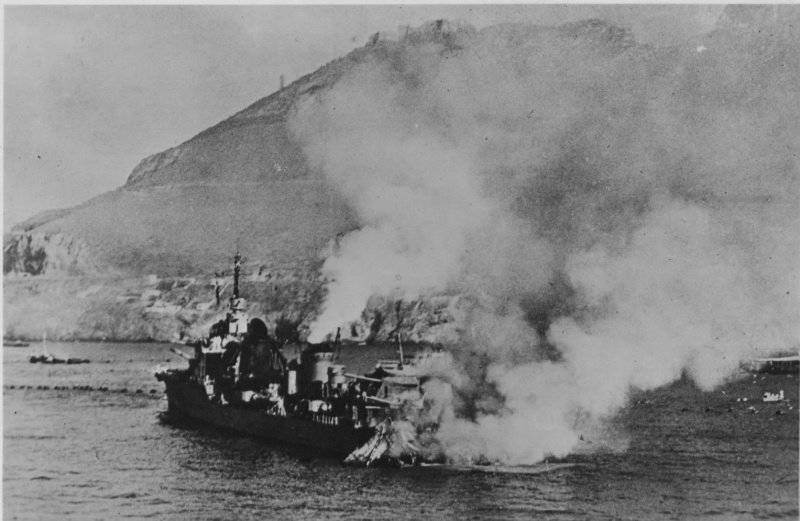
And Somerville had already laid down on the combat course. His squadron in the ranks of the wake was located in 14000 m on the north-north-west from Mers-El-Kebir, the course - 70, speed - 20 nodes. In 16.54 (in 17.54 British time), the first salvo was heard. Fifteen-inch shells with “Resolution” fell close to the length of the pier, behind which stood the French ships, peppered them with a hail of stones and shrapnel. After a minute and a half, the Provence first responded, firing 340-mm projectiles directly between the masts of the Dunkirk standing to its right - Admiral Gensoul was not going to fight at anchor at all, just the narrow harbor did not allow all ships to start moving at the same time (this and counted the British!). The battleships were ordered to line up in the following order: Strasbourg, Dunkirk, Provence, Brittany. Superemployees had to go to sea on their own - according to their ability. "Strasbourg", the stern mooring lines and the anchor chain of which were given before the first shell hit the pier, began to move immediately. And only he left the parking lot, as in a pier the shell, the fragments of which broke the halyards and the signal rey on the ship and pierced the pipe. In 17.10 (18.10), captain 1 of the rank of Louis Collins brought his battleship to the main fairway and the 15-junction also headed for the sea. All 6 destroyers rushed after him.
When a volley of 381-mm projectiles hit a pier, a mooring line was delivered to the Dunkirk and the food chain was poisoned. The tugboat, which helped to lift the anchor, was forced to chop off the moorings, when the second volley also hit the pier. The commander of "Dunkirk" ordered to immediately empty the tank with aviation fuel and in 17.00 ordered to open fire with the main caliber. Soon 130-mm guns entered into the business. Since the Dunkirk was the closest ship to the English, Hood, a former hunting partner for German raiders, concentrated its fire on it. At that moment, when the French ship began to depart from its berth, the first shell with the Hood hit him in the stern and. having passed through the hangar and non-commissioned officers' cabins, he went out through the side trim in 2,5 meters below the waterline. This projectile did not explode, since the thin plates that he pierced were not enough to fuse. However, in his movement through Dunkirk, he interrupted part of the wiring of the left side, disabled the crane engines for lifting seaplanes and caused the flooding of the left side fuel tank.
The return fire was fast and precise, although the determination of the distance was hampered by the conditions of the terrain and the location between the Dunkirk and the English of Fort Santon.
At about the same time, the hit came from “Brittany”, and in 17.03 a 381-mm projectile struck “Provence”, which waited until “Dunkirk” would enter the fairway to follow it. In the stern "Provence" the fire started and a large leak opened. I had to stick the ship to the shore with a bow at the 9-meter depth. By 17.07, the fire engulfed the Brittany from the bow to the stern, and two minutes later the old battleship began to tip over and suddenly exploded, taking the life of the 977 crew members with it. The rest began to be rescued from the “Commandant Test” hydro-drive vehicle, which miraculously escaped hits during the whole battle.
The “Dunkirk” 12 junction as it entered the fairway was hit by a volley of three 381-mm projectiles. The first one hit the roof of the tower of the CC №2 above the port of the right external gun, strongly pressing the armor. Most of the projectile ricocheted off and fell to the ground about 2000 meters from the ship. A piece of armor or part of the projectile hit the charging tray inside the right "half-tower", igniting the first two quarters of the empty powder cartridges. The entire servant of the "half-tower" died in smoke and flame, but the left-wing "half-tower" continued to operate - the armored partition isolated the damage. (On the battleship there were four-gun towers of the main caliber, divided inside each other. Hence the term "half-tower").
A second projectile struck near the 2-guns of the 130-mm turret of the starboard side, closer to the center of the ship from the edge of the 225-mm belt and broke through the 115-mm armored deck. The projectile seriously damaged the reloading section of the tower, blocking the supply of ammunition. Continuing his movement to the center of the ship, he broke through two splinter-proof bulkheads and exploded in the compartment of air conditioners and fans. The compartment was completely destroyed, all its personnel were killed or seriously injured. Meanwhile, in the reloading compartment of the starboard, several charging sleeves caught fire and several 130-mm projectiles loaded into the elevator exploded. And here all the servants were killed. The explosion also occurred at the air duct in the nasal engine room. Hot gases, flames and thick puffs of yellow smoke through the armor grille in the lower armored deck penetrated the squad where 20 people died and only ten managed to escape, and all the mechanisms were out of order. This hit turned out to be very serious, as it led to a power failure due to which the fire control system failed. The intact nasal turret had to continue firing under local control.
The third projectile fell into the water near the starboard a little further into the stern from the second, dived under the 225-mm belt and broke through all the structures between the casing and PTP, which, when struck, exploded. Its trajectory in the body was in the area of KO No. 2 and MO No. 1 (external shafts). The explosion destroyed the lower armor deck along the entire length of these compartments, the armor bevel over the fuel tank. PTP and starboard tunnel for cables and pipelines. The shell fragments caused a fire in the right boiler of KO No. XXUMX, damaged several valves in the pipelines and killed the main steam line between the boiler and the turbo unit. The overheated steam escaping with a temperature under 2 degrees caused fatal burns to the KO personnel, who stood in open places.
After these hits, Dunkirk continued to operate only KO No. 3 and MO No. 2, which served the internal shafts, which gave a speed of no more than 20 nodes. Damage to the starboard cables caused a brief interruption in the supply of electricity to the stern, until it was turned on for the left side. I had to switch to manual steering. With the failure of one of the main substations, nasal emergency diesel generators were switched on. Emergency lighting was lit, tower number XXUMX continued to conduct quite frequent fire on the “Hood”.
In total, prior to receiving the cease-fire order in 17.10 (18.10), Dunkirk launched 40-mm projectiles for the English 330 flagship, the volleys of which lay very tightly. By this time, after 13 minutes of shooting almost stationary ships in the harbor, the situation no longer looked unpunished for the British. "Dunkirk" and coastal batteries were intense fire, which was becoming more accurate, "Strasbourg" with destroyers almost went into the sea. All that was missing was the Motador, which slowed down to leave the tug when leaving the harbor, and a second later received a 381-mm projectile astern. 16 depth charges were detonated from the explosion and the destroyer stern was torn off almost over the bulkhead of the aft MO. But he was able to stick his nose to the shore at a depth of about 6.5 meters and, with the help of small vessels that had approached from Oran, began to put out the fire.
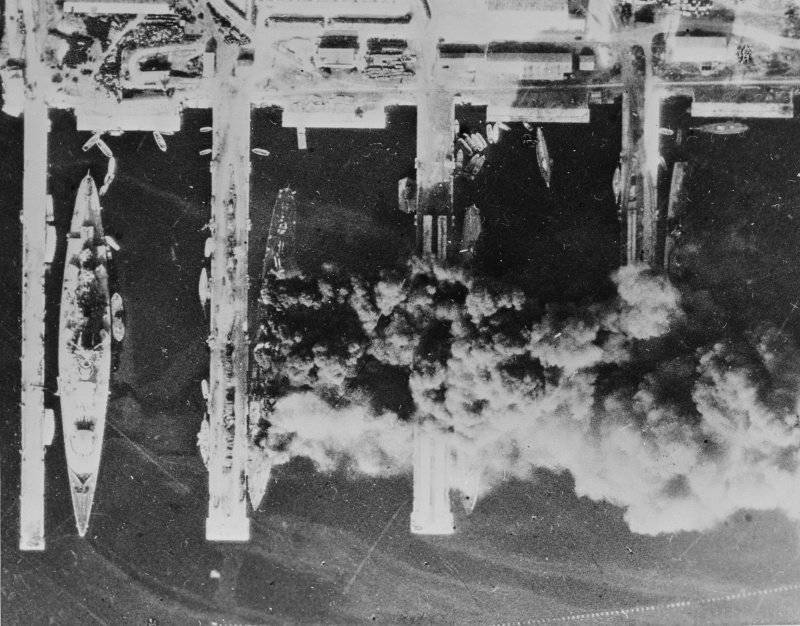
The British, satisfied with the sinking of one and the damage of three ships, turned back to the west and set a smoke screen. "Strasbourg" with five destroyers went for a breakthrough. Lynx and Tiger attacked Proteus submarine with depth bombs and prevented it from attacking the battleship. The Strasbourg itself opened heavy fire at the English destroyer Wrestler, which was guarding the exit from the harbor, forcing it to quickly retreat under the cover of a smoke screen. The French ships began to develop full speed. At Cape Canastel, six more destroyers from Oran joined them. To the northwest, within reach of the shooting, the English aircraft carrier ARK Royal was visible, almost defenseless against 330-mm and 130-mm projectiles. But the fight did not happen. On the other hand, six Suordfish, with 124-kg bombs and two Squiés in 17.44 (18.44), which were lifted from the deck of the Apk Royal, attacked Strasbourg. But they didn’t achieve hits, and one “Skue” was shot down with dense and accurate anti-aircraft fire, and two “Suordfish” were so damaged that they fell into the sea on their way back.
Admiral Somerville decided to chase on the flagship "Hood" - the only one who could catch up with the French ship. But by 19 (20) hours the distance between Hood and Strasbourg was 44 km and did not think to shrink. In an attempt to reduce the speed of the French ship, Sommerville ordered the Apk Royal to attack the departing enemy with torpedo bombers. After 40-50 minutes "Suordfish" with a small interval, carried out two attacks, but all the torpedoes, dropped outside the destroyers, passed by. The destroyer "Pursuvant" (from Oran) reported in advance to the battleship of the observed torpedoes and "Strasbourg" each time had time to shift the steering wheel. The chase had to stop. Especially since the following destroyers were running out with the "Hud" destroyers, "Velient" and "Resolution" were in a dangerous area without an antisubmarine escort, and there were reports from everywhere that strong forces of cruisers and destroyers were coming from Algeria. This meant being drawn into a night battle with superior forces. Connection "H" 4 July returned to Gibraltar.
“Strasbourg” continued to leave the 25-hub move until an accident occurred in one of the boiler sections. As a result, five people died, and the speed had to be reduced to 20 nodes. After 45 minutes, the damage was repaired, and the ship again brought the speed to 25 nodes. Having rounded the southern tip of Sardinia to avoid new clashes with the H and 20.10 on July 4, Strasbourg, accompanied by the leaders of Volta, Tiger and Terribl, came to Toulon.
But back to Dunkirk. In 17.11 (18.11) 3 in July, he was in such a state that it was better not to think about going to sea. Admiral Zensoul ordered the damaged ship to leave the fairway and go to the harbor of Saint-Andre, where the Fort Site and the terrain could provide some protection from the British artillery fire. After 3 minutes “Dunkirk” executed the order and dropped anchor at a depth of 15 meters. The crew proceeded to inspect the damage. The results were disappointing.
Tower number XXUMX out of order from a fire in the reloading compartment, the servant who died. The starboard wiring was interrupted and emergency parties tried to restore the power supply to the combat posts, putting other chains into operation. The bow MO and its KO failed, as well as the elevator of the tower №3 (4-ordinal 2-mm installation of the left side). The control of the tower №130 (GK) can be carried out manually, but there is no power supply to it. Tower No.2 is unharmed and is powered by energy from 1-kW diesel generators. Hydraulic mechanisms for opening and closing armor doors are disabled due to damage to the valves and the cumulative tank. The 400-mm and 330-mm gun rangefinders do not work due to the lack of energy. The smoke of the tower №130 forced during the battle to batten down the nasal 4-mm cellars. Around 130 hours in the elevator of the tower number XXUMX new explosions occurred. What to say - sadly. In this state, the ship could not continue the fight. But horrible, by and large, only three shells.
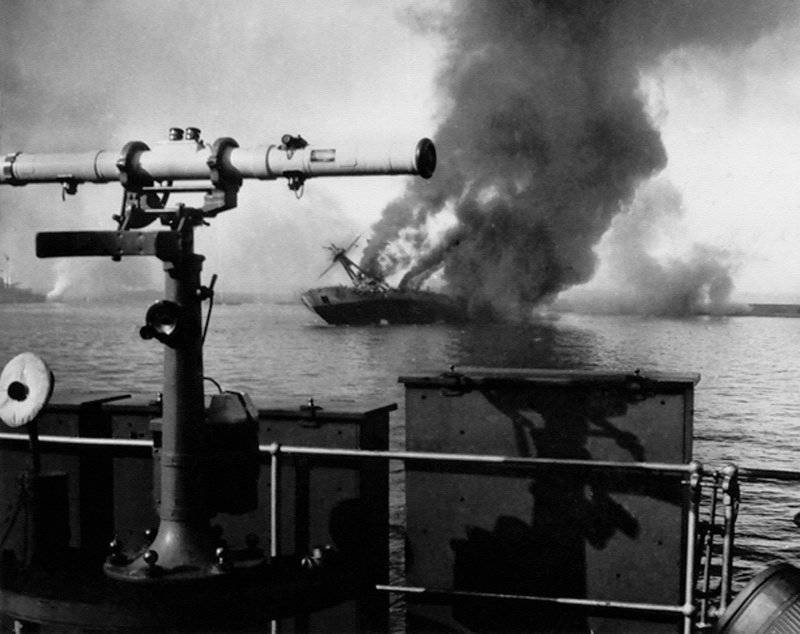
Fortunately, "Dunkirk" was in the database. Admiral Gensoul ordered to stick him to the shoals. Before touching the ground, a shell hole in the area of KO No. XXUMX, which caused flooding of several fuel tanks and empty starboard compartments, was sealed. Immediately, the evacuation of unwanted personnel began, and 1 people left to carry out repairs on board. At 400 hours, the tugs Estrel and Kotaiten, along with the patrol ships Ter Neuve and Setus, pulled the battleship to the shore, where he ran aground at a depth of 19 meters approximately 8 meters of the central part of the hull. For 30, the people on board began a difficult time. Started plastering plaster in places penetration plating. After a full restoration of the power supply, they began the dismal work of searching and identifying the fallen comrades.
On July 4, Admiral Esteva, commander of naval forces in North Africa, published a communiqué stating that "Dunkirk damage" is minor and will be quickly corrected. " This rash statement prompted a quick response from the Royal Navy. In the evening of July 5 Connection “H” again went to sea, leaving in the base a low-speed “Resolution”. Admiral Somerville decided instead of conducting another artillery battle to do quite modern - to use for the attack of the aircraft sticking to the bank of Dunkirk from the aircraft carrier Arc Royal. On 05.20 on July 6, being in 90 miles from Oran, the “Apar Royal” took to the air 12 torpedoes “Suordfish”, accompanied by 12 fighters “Skue”. The torpedoes were set at a speed of 27 nodes and a stroke depth of about 4 meters. Mers-el-Kebira’s air defense was not prepared to repel an attack at dawn, and only the second wave of aircraft met more intense anti-aircraft fire. And only then followed the intervention of the French fighters.
Unfortunately, the commander of the "Dunkirk" evacuated to the coast the servant of anti-aircraft guns, leaving on board only the personnel of the emergency parties. The patrol vessel "Ter Neuve" stood at the side, taking some crew members and coffins with the dead 3 July. During this sad procedure in 06.28, a raid of British aircraft, launched in three waves, began. Two "Suordfish" of the first wave dropped the torpedoes prematurely and they exploded on hitting the mole, without causing any harm. After 9 minutes, the second wave approached, but none of the three torpedoes dropped hit the Dunkirk. But one torpedo hit the Ter Neuve, which was just in a hurry to move away from the battleship. The explosion literally broke the small ship in half, and the fragments of its superstructure showered "Dunkirk". In 06.50, 6 "Suordfish" appeared with fighter cover. The link, which came from the starboard, came under heavy anti-aircraft fire and was attacked by fighters. Dropped torpedoes again did not reach the goal. The last group of three cars attacked from the left side, this time two torpedoes rushed to the "Dunkirk". One of them got into the tug Estrela, located about 70 meters from the battleship, and literally blew it off the surface of the water. The second, apparently with a faulty depth gauge, went under the keel of the Dunkirk and, hitting the stern part of the Ter Neuch wreckage, caused the detonation of forty-two 100-kilogram depth charges, despite the absence of fuses in them. The consequences of the explosion were terrible. A hole of about 40 meters in length was formed in the starboard lining. Several armor plates of the belt were displaced, and water filled the onboard protection system. By the force of the explosion, the steel plate above the armor belt was torn off and thrown onto the deck, burying several people under it. The anti-torpedo bulkhead for the length of 40 meters was detached from the mount, the other watertight bulkheads were torn or deformed. A strong lurch appeared on the starboard side and the ship sank with its nose so that the water rose above the armor belt. Compartments behind the damaged bulkhead flooded with salt water and liquid fuel. As a result of this attack and the previous battle on Dunkirk, 210 people died. Undoubtedly, if a ship were in deep water, such an explosion would have led to its rapid destruction.
A temporary plaster was put on the hole and 8 of August Dunkirk was dragged into free water. Repair work was moving very slowly. And where was the French rush? Only 19 February 1942, the Dunkirk, in full secrecy, went to sea. When the workers arrived in the morning, they saw their neatly folded tools on the embankment and ... nothing else. On 23.00 the following day, the ship reached Toulon, carrying on board some scaffolding from Mers-El-Kebir.
The English ships in this operation did not receive damage. But they hardly completed their task. All modern French ships survived and hid in their bases. That is, the danger that, from the point of view of the English Admiralty and the government, existed from the part of the former allied fleet, remained. In general, these concerns seem somewhat contrived. Did the British consider themselves to be more stupid than the Germans? After all, the Germans were able in 1919 to flood their internment in the British base Scapa Flow fleet. But then, far from complete crews remained on their disarmed ships, the war in Europe had already ended a year, and the British Royal Navy fully controlled the situation on the seas. Why was it possible to expect that the Germans, besides not having a strong fleet, would be able to prevent the French from scuttling their ships in their own bases? Most likely, the reason that made the British so cruel to do with a former ally, was something else ...
The main result of this operation can be considered that the attitude towards former allies among French sailors, who were almost 3% pro-English before July, has changed and, naturally, is not in favor of the British. And only after almost two and a half years, the British leadership was convinced that his fears about the French fleet were in vain, and that hundreds of sailors died in vain on his instructions at Mers-El-Kebir. The loyal French sailors at the very first threat of the capture of their fleet by the Germans flooded their ships in Toulon.
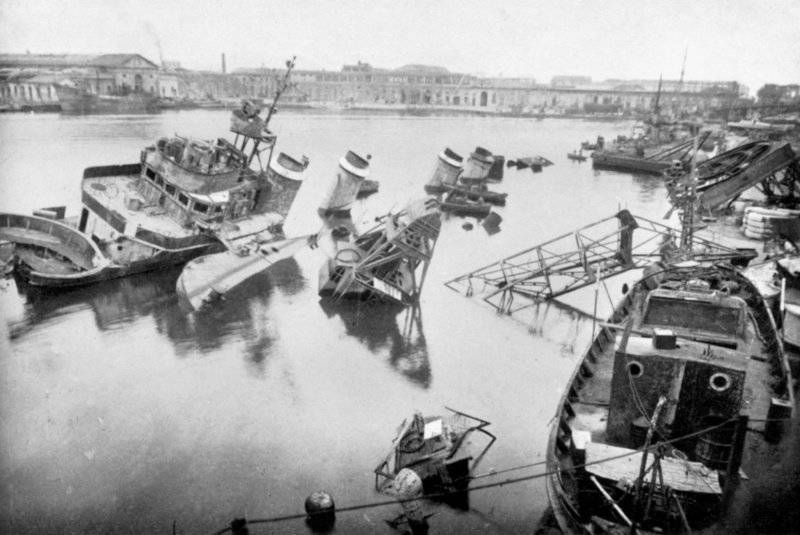
On November 8, 1942, the Allies landed in North Africa and a few days later the French garrisons ceased resistance. Surrendered to the allies and all the ships that were on the Atlantic coast of Africa. In retaliation, Hitler ordered the occupation of southern France, although this was in violation of the terms of the 1940 armistice. At dawn on November 27, German entered Toulon Tanks.
At that time there were about 80 warships in this naval base of France, with the most modern and powerful ships assembled from all over the Mediterranean - more than half of the fleet tonnage. The main striking force — Admiral de Laborde's Open Sea Fleet — consisted of the flagship battleship Strasbourg, the heavy cruisers Algeria, Duple and Colbert, the cruisers Marseillaise and Jean de Vienne, 10 leaders and 3 destroyers. The commander of the naval district of Toulon, Vice-Admiral Marcus, had under his command the battleship Provence, the hydroavian carrier Commandant Test, two destroyers, the 4 destroyer and the 10 submarines. The rest of the ships (damaged Dunkirk, heavy cruiser Foch, light La Galissonier, 8 leaders, 6 destroyers and 10 submarines) were disarmed under the armistice terms and had only part of the crew on board.
But Toulon was not crowded with sailors alone. A huge wave of refugees, driven by the German army, flooded the city, making it difficult to organize the defense and creating a lot of rumors that left the panic. The army regiments that had come to the aid of the base’s garrison were determined against the Germans, but the naval command was more concerned about the possibility of the repetition of Mers-el-Kebir from the Allies, who had introduced powerful squadrons into the Mediterranean. In general, we decided to prepare for the defense of the base from everyone and to flood the ships as if the Germans and allies were threatening to capture them.
At the same time, two German tank columns — one from the west and the other from the east — entered Toulon. The first had the task of capturing the main shipyards and moorings of the base where the largest ships were stationed, the other — the command post of the commandant of the okrug and the shipyard Murillon.
Admiral de Laborde was on his flagship when a message arrived at 05.20 that the shipyard Muillon was already captured. Five minutes later, German tanks blew up the northern gate of the base. Admiral de Laborde immediately gave a general order on the fleet on the radio for immediate flooding. The radio operators repeated it continuously, and the signalmen raised the flags on the falakh: “Drown! Stay on fire! Stay up! ”
It was still dark and the German tanks got lost in the labyrinths of warehouses and docks of a huge base. Only about 6 hours did one of them appear at the Milkhod piers, where the Strasbourg and three cruisers were moored. The flagship has already moved away from the wall, the crew was preparing to leave the ship. Trying to do anything, the tank commander ordered a cannon to be fired at the battleship (the Germans claimed that the shot happened by chance). The shell hit one of the 130-mm turrets, killing an officer and wounding several sailors who installed explosive charges on the guns. Immediately anti-aircraft guns returned fire, but the admiral ordered him to stop.
It was still dark. A German infantryman approached the edge of the jetty and shouted at Strasbourg: "Admiral, my commander says that you must surrender your ship intact."
De Laborde shouted back: "He is already flooded."
A discussion in German followed ashore and a voice came again:
“Admiral! My commander conveys his deepest respect to you! ”
Meanwhile, the commander of the ship, making sure that the Kingston in the engine rooms were open and there were no people in the lower decks, gave the siren a signal for execution. Immediately "Strasbourg" girdled explosions - one after another exploded guns. Internal explosions caused a heaving of the skin and the gaps and gaps formed between its sheets accelerated the flow of water into the huge hull. Soon the ship sat on the bottom of the harbor on an even keel, plunging into silt on the 2 meter. The upper deck was in 4 meters under water. Oil spilled around from broken tanks.
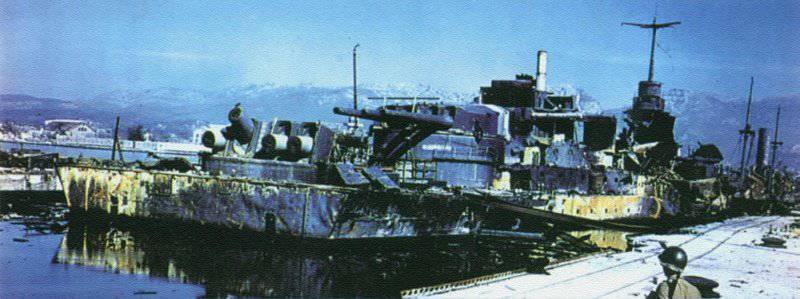
On the heavy cruiser "Algeria", the flagship of Vice Admiral Lacroix, the stern tower was blown up. “Algeria” burned for two days, and the cruiser “Marseillaise”, which had landed near the bottom with the 30-degree roll, burned for more than a week. The cruiser Colbert, nearest to the Strasbourg, began to explode when two crowds of Frenchmen fleeing from it and trying to get on board the Germans collided on its side. A whistle of people flying from everywhere around the fragments were swept up in search of protection, illuminated by a bright flame set on fire in the plane's catapult.
The Germans managed to climb aboard the heavy cruiser “Duplais” moored in the Missiescia Basin. But then the explosions began and the ship sank with a large roll, and then was completely destroyed by the explosion of the cellars in 08.30. They were also unlucky with the “Provence” battleship, although it did not start flooding longer than the others, because it received a telegram from the German commandant’s headquarters seized by the base command: “Monsieur Laval’s order (Prime Minister of the Vichy government) was received that the incident was settled.” When they realized that it was a provocation, the crew did everything possible so that the ship would not get to the enemy. The maximum that the Germans were able to do, who had time to rise to the leaning deck that was coming out from under their feet, was to declare officers of Provence and headquarters officers led by the division commander, Rear Admiral Marcel Jarry, prisoners of war.
Docked at the dock and almost no crew "Dunkirk" was more difficult to flood. On the ship, they opened everything they could to let water into the hull, and then opened the dock gate. But the dock was easier to drain than lift the ship lying on the bottom. Therefore, everything that could be of interest was destroyed on Dunkirk: guns, turbines, range finders, radio equipment and optical devices, control posts and entire superstructures were undermined. This ship never sailed again.
18 June 1940 in Bordeaux, the commander of the French fleet, Admiral Darlan, his assistant, Admiral Ofan, and a number of other senior naval officers gave the floor to representatives of the British fleet that they would never allow the capture of French ships by the Germans. They fulfilled their promise, flooding in Toulon 77 the most modern and powerful ships: 3 battleship ( "Strasbourg", "Provence", "Dyunkerk2), 7 cruisers, 32 destroyer of all classes, 16 submarines gidroaviatransport" Commandant Test ", 18 guard and smaller ships.
There is a saying that when the English gentlemen are not satisfied with the rules of the game, they simply change them. History It contains many examples where the actions of the “English gentlemen” corresponded to this principle. “Right, Britain, the seas!” ... The rule of the former “mistress of the seas” was strange. Paid with the blood of French sailors in Mess-El-Kebir, English, American and Soviet in the Arctic waters (why the hell are we going to forget you PQ-17!). Historically, England would only be good as an enemy. Having such an ally is clearly more expensive.
http://ship.bsu.by,
http://wordweb.ru
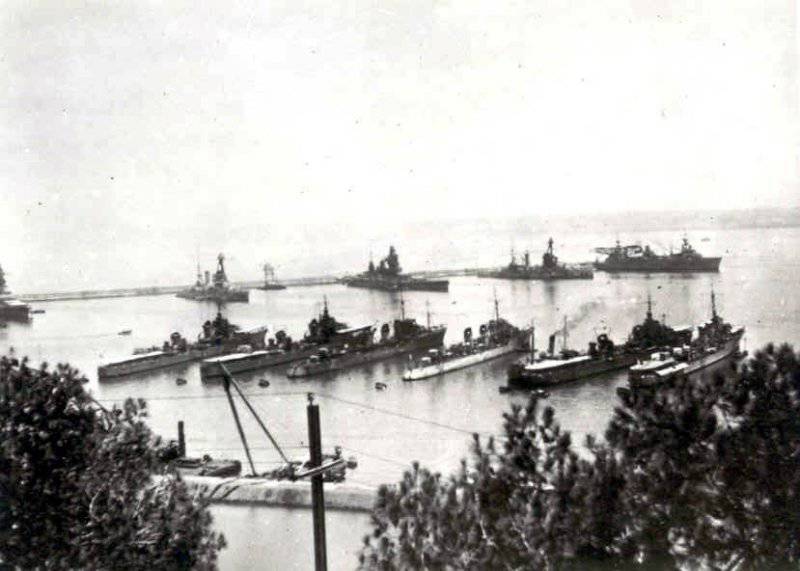
Information